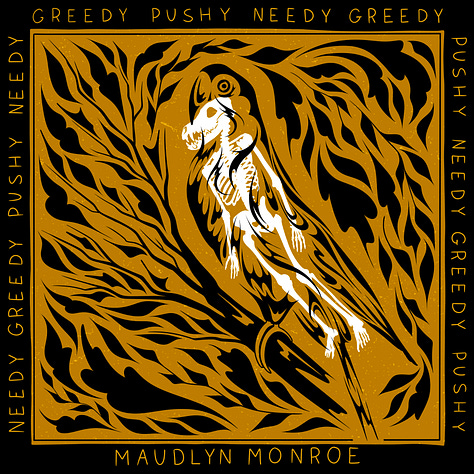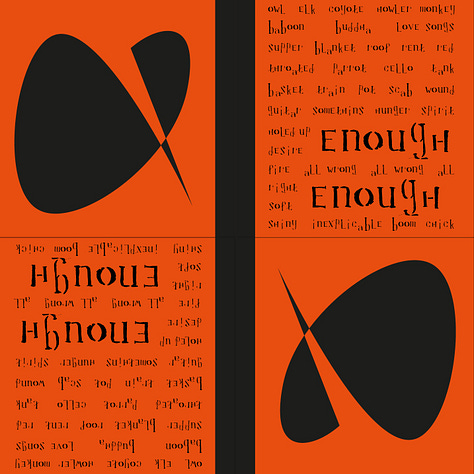What does it mean to use music as medicine, when music also needs to be a commodity?
ONE WEEK to get real greedy pushy needy
in this post: 1) It’s the final countdown 2) What does it mean to use music as medicine, when music also needs to be a commodity? 3) buying music 4) interview w/ CanvasRebel
IT’S THE FINAL COUNTDOWN
The first of the albums I spent last year recording is out next week!
greedy pushy needy will be out on all the platforms, and I do hope you’ll listen.



I also, of course, hope you like it! I certainly do. And if you are in the camp of either liking it and wanting to support it, or just liking me, the two best ways you can support it are:
to share it far and wide!—whether that be tagging it or using the music in a social media post, adding it to your Spotify playlists, or good old word-of-mouth recommendation to friends
to buy the digital tracks or merch directly from Bandcamp (and I’ll tell you something, if you want me to hand-burn you a CD, I will totally do that—I might ask shipping if you’re not local but I will totally do that)
to buy on Bandcamp Friday, when that kind platform literally removes their fee and sends 100% of the money you pay directly to artists
What does it mean to use music as medicine, when music also needs to be a commodity?
This is the question I find myself diving into more and more, as I both attempt to figure out the new economy of independent music and how to make a living, and as I make more and more space for neurodivergence, Madness, and just plain humanity in my life and songs. I only have a glimpse of the answer, but I’ll be thinking through it in the coming year.
BUYING MUSIC
Does anyone buy music anymore?
Scratch that, I know some do! But how many? If you didn’t know, Spotify and streaming services—which are absolutely incredible for sharing work—are also absolutely gutting artist income. Here’s what music math looks like before and after streaming:
BEFORE STREAMING: say you buy an album, $10 for 10 tracks, $1 per track, and every time you play a song, it gets cheaper and cheaper. Every album bought gives significant profit to the artist. If you buy directly, they get all that cash. If it goes through a particularly high fee structure, say they make $4-5/album, $.40-.50/song.
AFTER STREAMING: say you don’t buy any albums, and you stream music, like 76% of people do! And musicians appreciate you listening and sharing! Last I saw, artists are currently getting around $.0033 per stream on Spotify, which means it takes 300 streams of a song to make a single dollar.
So unless you have many thousands of streams, there’s not much money to be made until you have huge volume. Then the streaming income gets split between publishing and distribution entities. There are various splits that happen on the way to the artist that are legitimate, but the money being directed into the split in the first place is pretty “abysmal.”
If I also told you the cost of producing any single recording, you’d be screaming at the walls.
Why do I tell you this? It’s mostly because I think everyone should know. The industry model shifted significantly while I was away, and I don’t think most people who enjoy music have any clue. In some ways, music has become a very expensive service musicians provide.
This model is completely unsustainable for musicians, and, musicians will keep making music. Because music is a human necessity, for makers and listeners alike. Music is community, music is medicine, and of course, tons of music isn’t recorded. Tons of wonderful music is just shared by people, for people, between people, out of need and celebration and rage and grief and joy and love. It would be beautiful if music and art didn’t have to concern themselves much with capital and income at all!
But professional artists deserve a living wage. So if you are someone who listens to music, I urge you to support artists directly, go to shows and buy merch from the table, buy through from platforms like Bandcamp with a very low fee structure, familiarize yourself with the Music Modernization Act, advocate for more legislation that directs income toward artists in the age of streaming.
INTERVIEW W/ CANVASREBEL
I did a thing! I did an interview with CanvasRebel (they keep calling me Maudlyn, it’s funny/cute/wrong/I keep saying to people who call me maudlyn “it’s an understandable confusion, maybe I should just lean into it” and I never do).
Honestly, a lot that I could write in a newsletter/Substack post is right there in that interview—I’ll end up repeating aspects of it here, over time, but it’s a pretty sweet condensed little mission statement over there.
I hope you are all surviving, with lots of support, in these forever troubled times. Sending much love, and much music as medicine.
-slp






